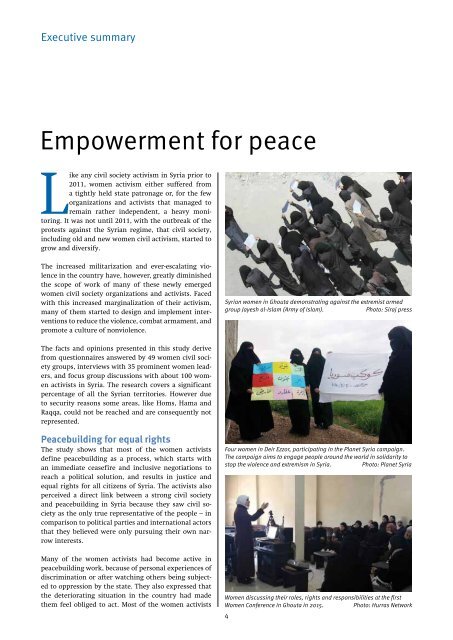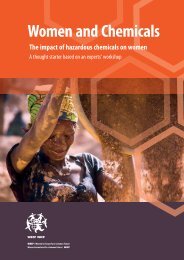future now”
YAO19
YAO19
Create successful ePaper yourself
Turn your PDF publications into a flip-book with our unique Google optimized e-Paper software.
Executive summary<br />
Empowerment for peace<br />
Like any civil society activism in Syria prior to<br />
2011, women activism either suffered from<br />
a tightly held state patronage or, for the few<br />
organizations and activists that managed to<br />
remain rather independent, a heavy monitoring.<br />
It was not until 2011, with the outbreak of the<br />
protests against the Syrian regime, that civil society,<br />
including old and new women civil activism, started to<br />
grow and diversify.<br />
The increased militarization and ever-escalating violence<br />
in the country have, however, greatly diminished<br />
the scope of work of many of these newly emerged<br />
women civil society organizations and activists. Faced<br />
with this increased marginalization of their activism,<br />
many of them started to design and implement interventions<br />
to reduce the violence, combat armament, and<br />
promote a culture of nonviolence.<br />
Syrian women in Ghouta demonstrating against the extremist armed<br />
group Jayesh al-Islam (Army of Islam). <br />
Photo: Siraj press<br />
The facts and opinions presented in this study derive<br />
from questionnaires answered by 49 women civil society<br />
groups, interviews with 35 prominent women leaders,<br />
and focus group discussions with about 100 women<br />
activists in Syria. The research covers a significant<br />
percentage of all the Syrian territories. However due<br />
to security reasons some areas, like Homs, Hama and<br />
Raqqa, could not be reached and are consequently not<br />
represented.<br />
Peacebuilding for equal rights<br />
The study shows that most of the women activists<br />
define peacebuilding as a process, which starts with<br />
an immediate ceasefire and inclusive negotiations to<br />
reach a political solution, and results in justice and<br />
equal rights for all citizens of Syria. The activists also<br />
perceived a direct link between a strong civil society<br />
and peacebuilding in Syria because they saw civil society<br />
as the only true representative of the people – in<br />
comparison to political parties and international actors<br />
that they believed were only pursuing their own narrow<br />
interests.<br />
Many of the women activists had become active in<br />
peacebuilding work, because of personal experiences of<br />
discrimination or after watching others being subjected<br />
to oppression by the state. They also expressed that<br />
the deteriorating situation in the country had made<br />
them feel obliged to act. Most of the women activists<br />
Four women in Deir Ezzor, participating in the Planet Syria campaign.<br />
The campaign aims to engage people around the world in solidarity to<br />
stop the violence and extremism in Syria. <br />
Photo: Planet Syria<br />
Women discussing their roles, rights and responsibilities at the first<br />
Women Conference in Ghouta in 2015. Photo: Hurras Network<br />
4



